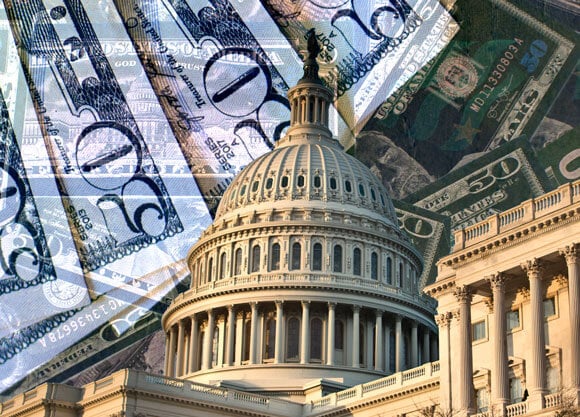
Economics professor offers roadmap for solving national debt crisis
January 31, 2023

January 31, 2023

“The national debt is the debt the U.S. government has incurred,” said Ball, who is an associate professor of economics and director of the Central European Institute as well as the Istvan Szechenyi Chair. “It is, however, our debt because a government’s only serious source of income is what it collects from its citizens in taxes."
Our nation’s debt really means our debt, he said.
“It is in this regard that it is ‘our nation’s’ debt which literally means ‘our debt.’ Of course it is only part of our total debt because we privately have debt and private companies have debt as well," he said. "You can think of the national debt as our government’s total credit card debt. The government’s 'deficit' is more like how much it put on its credit card this month or this year. The 'debt' is the total amount it owes. And, of course, the government doesn’t really have a giant credit card, it issues bonds that people buy as an investment. So the national debt is largely made up of U.S. Treasury bonds sold to domestic and international investors, all expecting to be repaid with interest.”
The national debt is a major piece of our economy which drives major decisions every year, which bodes the question, why is it so important?
“Just like your personal debt, it only becomes really important if you have trouble paying it back," he said. "Then it becomes a disaster. It is important because the government must either raise taxes or cut spending somewhere to make financial resources available to pay the debt. So that hurts other programs the government wants to fund or raises taxes, slowing economic growth and potentially raising unemployment, which it would otherwise like to avoid. Because our debt has gotten so large, global investors may become concerned we can’t repay it. In that case, they start charging higher and higher interest rates to lend us anything and that raises the cost of our debt and means we have to cut more and more elsewhere to pay for it.”
This would lead to an economic crisis, Ball added.
“The U.S. debt happens to be unique," he said. "U.S. debt is considered the safest investment in the world. Finance people sometimes call it ‘riskless’. And all banking, financial and other regulators require banks and investment businesses to maintain a certain amount of ‘low risk’ debt, meaning U.S. debt. So if we have trouble paying it back, it suddenly becomes ‘risky’ and this causes trouble in every bank in America and many banks around the world. And that would just be the start. A true risk of U.S. default on the debt would completely shake the global financial system and economies.”
The national debt has continued increased rapidly in recent years, faster than some anticipated.
“The U.S. debt to GDP started to rise in the 1980s as we maintained high levels of government spending, expanding military/defense spending and cut taxes," he said. "It slowed in the 1990s when we had welfare and other reforms, then stayed relatively flat until the 2008 financial crisis. When that crisis hit, our debt was about 64% of GDP. By the end of 2010 it was 91% of GDP. That’s a very large increase and was, again, done to stimulate the economy and avoid a recession. It continued to increase until it hit about 100% of GDP at the end of 2012. It then remained relatively constant until Covid, then spiked to 134% of GDP in the second quarter of 2020.”
This number can be misleading because debt/GDP is in fact a ratio, said Ball.
“We both increased the numerator (debt) and lowered the denominator (GDP) during the Covid crisis in those months. More reasonably measured it probably his 120% or so which is where it’s essentially stayed ever since. That’s still extremely high.”
Solving the national debt will not happen overnight, Ball said, yet there are different approaches to potentially solve this crisis.
“The government can either cut spending or raise taxes or both," he said. "I personally think the government is spending way too much in way too many areas of the economy and should cut spending. I would love to see a more rationalized tax system than we have now, but fundamentally we need to get spending under control. This will be hard because Congress has pushed most of our spending to what are called “entitlements” and are sort of mandated by law. As a result, our elected officials today are debating over their control of a relatively small fraction of the spending they can control. I think they can control about 10-15% of the total spending each year. The rest is required by law.”
Quinnipiac Today is your source for what's happening throughout #BobcatNation. Sign up for our weekly email newsletter to be among the first to know about news, events and members of our Bobcat family who are making a positive difference in our world.
Sign Up Now